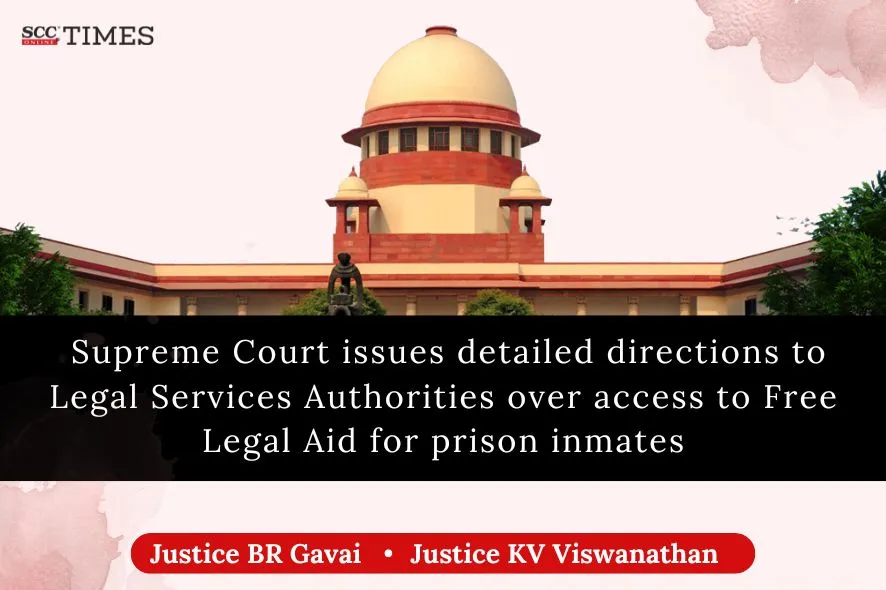Supreme Court: The instant writ petition sought issuance of an appropriate Writ, Order or direction to the Union of India, States and the Union Territories to ensure that no prisoner is subjected to torture, cruel, inhumane and degrading treatment or punishment because of living in overcrowded and unhygienic conditions in jail; furthermore, a prayer was made for creating a permanent mechanism to decongest the overcrowded prisons.
The Division Bench of B.R Gavai and KV Viswanathan*, JJ., while deliberating over the matter identified 2 major issues- (1) Open Correctional Institutions and (2) Modalities for visitation by lawyers in jail to ensure free legal aid to the deserving prison inmates.
Clarifying that the instant judgment deals with the aspect of access to free legal aid for prison inmates and the issue of “Open Correctional Institutions” will be heard and considered separately, the Division Bench gave the following directions to the Legal Services Authorities in this respect:
-
Legal Services Authorities at different levels will continue to work with the same momentum to achieve the constitutional objectives and objectives of the Legal Services Authorities Act, 1987.
-
NALSA in cooperation with the SLSAs and the DLSAs will ensure that the SOP on Access to Legal Aid Services to prisoners and functioning of Prisoner Legal Aid Clinics (PLACs) are operated efficiently in practice. NALSA will periodically update and improve the measures prescribed under the SOP-2022 to address any of the inadequacies that may emerge while operating the same at the field level.
-
Legal Services Authorities at different levels will adopt methods to strengthen the monitoring of PLACs and to review their functioning periodically. Legal Services Authorities will also periodically update the statistical data and after analysing the results take steps to address the shortcomings that may come to light.
-
Legal Services Authorities, at all levels, should ensure that the Legal Aid Defence Counsel System, which is a pioneering measure, functions to its full potential. In this regard, periodic inspection and audit of the work of the Legal Aid Defence Counsels should be carried out. Steps should also be taken to improve the service conditions of the personnel working in the Legal Aid Defence Counsel system, whenever it is felt necessary and appropriate.
-
A robust mechanism should be put in place and periodically updated to ensure that the various beneficial schemes promoted by the Legal Services Authorities reaches the nook and corner of the nation and particularly, to those whose grievances it has set out to address. Adequate literature including in the local languages in the States and appropriate promotional methods should be launched so that the consumers of justice to whom the schemes are intended can make best use of the same, in the following ways:
-
Police stations, post offices, bus stands, railway stations etc. boards in prominent places be displayed furnishing the address for contact and the phone numbers of the nearest legal aid office. This should be done in the local language and in English.
-
Promotional campaigns in the local language be undertaken through Radio/All India Radio/ Doordarshan. This will be in addition to the promotional measures undertaken through the digitalization process — like hosting of websites and prominent mention thereon on the landing page of the legal services authority wherever permissible.
-
To create complete awareness about the existence of legal aid schemes, promotional campaigns may include such other creative measures including organization of nukkad nataks in rural areas so that the poor rural masses comprehend the facility available to them through the legal aid scheme. These should be undertaken without dislocating the normal life of citizens.
-
-
Legal Services Authorities will periodically review and update SOP-2022 for the Undertrial Review Committee (UTRC). The huge gap between total number of persons identified by the UTRC and the number of persons recommended for release should be looked into and adequate corrective measures be taken. Similarly, the difference between the number of prisoners/inmates recommended for release and the number of bail applications filed should be particularly investigated by NALSA/SLSAs/DLSAs and adequate corrective measures taken.
-
The “Early Access to Justice at Pre-arrest, Arrest and Remand Stage Framework” established by NALSA for pre-litigation assistance should be diligently pursued and the work undertaken under the framework be periodically reviewed.
-
Interaction by the Legal Service Authorities at different levels with convicts who had not preferred appeals should be periodically undertaken and the convicts be informed of their right to free legal aid.
-
Periodic interaction should be held with Jail Visiting Lawyers (JVLs) and Para Legal Volunteers (PLVs) to ensure updation of their knowledge so that the system functions efficiently as a whole.
-
Steps for continuing education of lawyers involved in prelitigation assistance and those associated with the Legal Aid Defence Counsel set-up should be provided by Legal Services Authorities. It should also be ensured that adequate law books and access to online libraries are available to lawyers engaged at the pre-litigation assistance stage and those involved with the Legal Defence Counsel set-up.
-
Periodic reports should be submitted by the DLSAs to the SLSAs and the SLSAs to the NALSA. Furthermore, NALSA should digitise the whole process to get details of the updates done by SLSAs and DLSAs on regular basis.
-
Union of India and the State Governments shall continue to extend their cooperation and assistance to the Legal Services Authorities at different levels for the effective implementation of the measures taken by them.
-
The Court finally directed the Registry to forward a copy of the judgment to all the High Courts so that they may consider the feasibility of issuing a practice direction regarding informing the convict about the availability of free legal aid facilities for pursuing higher remedies. The High Courts may carry information about the legal aid facilities available in the State on their webpage.
Court’s Assessment:
Before issuing the afore-stated directions, the Court considered the Constitutional Scheme under Article 39-A of the Directive Principles of State Policy which talks of equal justice and free legal aid. The Court further delved into relevant judicial precedents such as Hussainara Khatoon (IV) v. Home Secretary, State of Bihar, (1980) 1 SCC 98; Sunil Batra (II) v. Delhi Administration, (1980) 3 SCC 488, all of which have highlighted that need for legal aid for the prisoners and undertrials.
The Court further delved into the statutory scheme under Legal Services Authorities Act, 1987, which was enacted with the aim to constitute legal services authorities to provide free and competent legal services to the weaker sections of society and to ensure that opportunities for securing justice are not denied to any citizen by reason of any economic or other disabilities. The legislation further created the National Legal Services Authority (NALSA), State Legal Services Authority (SLSA) and District Legal Services Authorities (DLSA) to attain the objectives of the 1987 Act.
The Court further took note of NALSA-Standard Operating Procedures (SOPs) on Access to Legal Aid Services to Prisoners and Functioning of the Prison Legal Aid Clinics, 2022, which were formulated to on access to legal aid services to prisoners and functioning of the Prison Legal Aid Clinics (PLACs).
NALSA SOP-2022 also deals with the duties of the Jail Visiting Lawyers (JVLs) and the Paralegal Volunteers (PLVs). Furthermore, NALSA SOP-2022 also outlines the procedure for ensuring smooth filing of petitions of the convicts in High Courts and the Supreme Court.
The Court took note of a pioneering measure adopted by NALSA since the year 2021- 22, that is the introduction of the Legal Aid Defense Counsel System (LADCS), to strengthen and professionalize legal services delivered. The Court noted that currently around 611 of the 703 districts in the country have the Legal Aid Defense Counsel System in place.
LADCS is an institutionalized method of providing defense counsel assistance in legal aid matters that includes dedicated, full-time experienced lawyers to represent the accused. The lawyers exclusively deal with criminal legal aid cases ensuring effective and efficient representation, timely and effective client consultations, effective monitoring of legal aid cases, professional management of legal aid work in criminal matters and enhance responsiveness to the litigant.
The Court noted that NALSA has time and again undertaken special campaigns for prisoners to ensure timely access after recognizing the unique challenges faced by the convicts in accessing justice.
Emphasising on awareness, the Court pointed out that the most important task in any legal service is spreading its awareness to the needy. The status report of NALSA indicated that convicts were made aware about the availability of free legal services, availability of the right to file Appeals/SLPs and the process of filing the same. “This guarantees and effectuates Article 21 inasmuch as for the convict in custody too, who is virtually incommunicado with the outside world, is positively made aware about his rights in the nature of the existence of a right of appeal and the facility available for availing free legal services. This brings into full play Section 341 of Nagarik Suraksha Sanhita, 2023”.
Taking note of the Report submitted by NALSA vis-a-vis measures taken to ensure legal aid to the unprivileged especially prisoners and undertrials, the Court took note that steps are being taken to ensure that necessary documents are collected along with the custody certificate and vakalatnama. Translation, interrogation through video conferencing and drafting of applications are also arranged by NALSA. The Court was also satisfied to observe that insofar as provision of legal services are concerned, NALSA with the effective coordination of the SLSAs and DLSAs and assisting agencies are rendering yeomen service to realize the constitutional goal of Article 39-A and for the effective implementation of the provisions of the Legal Services Authorities Act, 1987.
The Court took note of NALSA SOP- For (Under Trial Review Committees (UTRCs) which is a separate Standard Operating Procedure for the smooth functioning of the Under Trial Review Committees (UTRCs). It was observed that UTRC meetings have resulted in the recommendation for release of 3,13,888 prisoners and the actual release of 1,52,570 prisoners across India. Acknowledging that there could be unintended lapses in the identification of prisoners, NALSA has taken corrective steps.
However, the Court also took note of NALSA;s acknowledgement that there has been continued detention of persons even when they are eligible for statutory bail under Sections 436A, 436, 167(2), CrPC; the continued detention of persons with mental illness despite statutory safeguards; the continued arrest and detention of persons under offences carrying less than 7 years punishment despite the directives of Supreme Court. Limited use of liberal bail provisions for women and sick or infirm persons are some of the reasons, according to NALSA, for large number of persons continuing to remain behind bars.
The Court emphasised that NALSA, SLSAs and DLSAs can all help the prison authorities and the Courts by acting as a bridge in ensuring that the data is fed and made available to the Court.
The Court also took note of State-wise breakup of total convicts and convicts who filed appeals, the data for which was gathered in pursuance to the Supreme Court’s order dated 09-05-2024 and 17-05-2024.
The Court finally reiterating that, “Legal aid to poor should not be poor legal aid”, commended the initiatives taken by NALSA so far and issued the afore-stated directions to make the initiatives more effective.
CASE DETAILS
|
Citation: Appellants : Respondents : |
Advocates who appeared in this case
|
CORAM :









